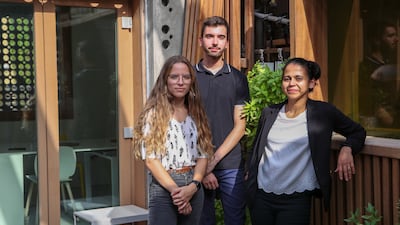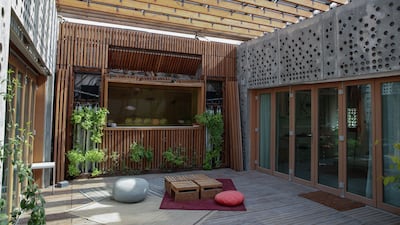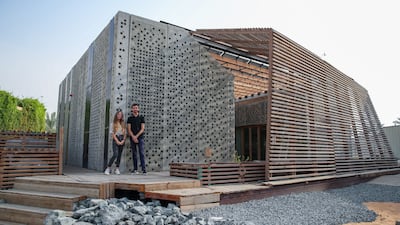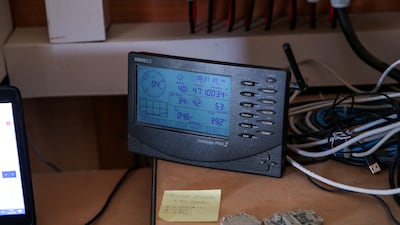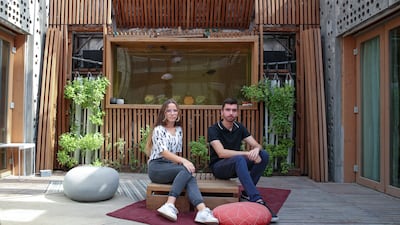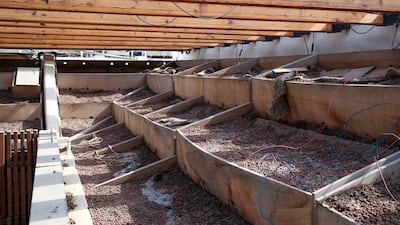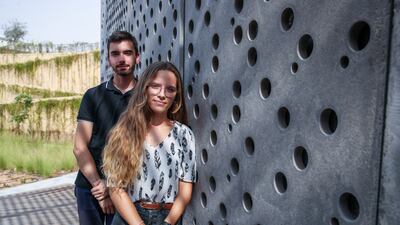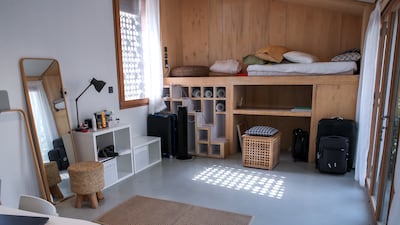A team of enterprising students is sending a message on sustainable living by setting up residence in a net-zero house in Dubai.
The eco champions, from universities in Dubai, Palestine and France, helped to design the 100 per cent solar-powered property, known as BaityKool.
It is designed to cope with the hot desert climate, using the power of the sun to cut energy use as part of a mission to save the planet.
Built in 2018, the innovative home won third place in the Solar Decathlon Middle East, a contest that challenges student teams to design and build sustainable homes.
Recently, the home was dismantled and reassembled at its new base in Sustainable City in Dubai and the very students that helped bring the concept to life are now residents.
“We have students like myself living in the house so we can experience what it is like to live in a truly sustainable home,” said Axel Bule, a mechanical engineering student from the University of Bordeaux who helped to design and construct BaityKool.
Living the green dream
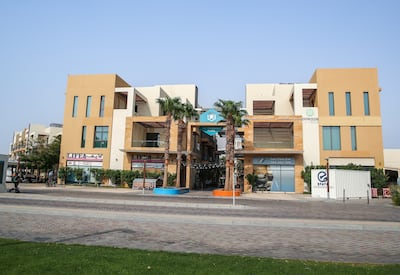
“Our mission is to bring forward our recommendations on how to improve the project for future use.
“Myself and my classmate Noemie Jaupart arrived in Dubai on June 11 and we will be living in the house until the end of August before new students arrive to take over the residence.
“During our time here we have to evaluate the comfort of the home and the systems in it, such as the water filtration and the aquaponics, where we grow produce.”
More than one month into his stay, Mr Bule said the list of recommendations so far includes keeping windows, doors and blinds closed as much as possible “to reduce the solar radiation inside the house”, improve thermal insulation and exterior air inlets and create air movement inside the house using portable fans.
He said temperatures inside the property in the daytime can reach about 26ºC, which can be uncomfortable at times.
Pressing need to boost sustainability
The environmental case for more sustainable living is clear.
As the world’s demand for energy increases, homes are one of the biggest culprits when it comes to energy waste.
In the UK, more than 20 per cent of the country’s carbon emissions come from homes.
Old appliances, setting thermostats too high or low and leaving lights on are all habits that contribute to energy waste.
But by coupling design and technology improvements, household emissions can be significantly reduced, saving on bills and reducing harmful effects on the environment.
Smart by design
To achieve net zero, BaityKool was designed to reduce heat gains and cooling demand and was equipped with 8KWp of photovoltaic panels.
The house also has a wastewater recycling system, where water used in showers and washing up is filtered using lumbrifiltration and bio solar purification methods to kill bacteria.
The water is then reused for other uses in the house, such as watering plants.
The house, made from natural clay bricks, is also adaptable to humidity. The communal area is around a central courtyard, modelled on the ancient ways of life that help to generate air flow.
Inside the house, a vertical aquarium aquaponics wall has been created to grow vegetables including tomatoes, lettuce, eggplant and herbs using recycled water.
“In the future features like that could be used to harvest between 10 per cent and 20 per cent of a small family’s food produce,” said Vidya Mohanan, a civil engineering lecturer at Amity University in Dubai, who has been overseeing the project.
“We rotate students living in the house so they can understand the behaviour of it and understand how they need to change their habits to live more sustainably.
“Dubai has a hot and humid climate so to provide comfort in our prototype, while acting efficiently and ecologically, the team developed the Radiative Sky Cooling system, which is the property’s main thermal innovation.”

Baitykool was reassembled in The Sustainable City on a 20 metre by 20 metre plot and its built-up area is 90 square metres.
Salah Habib, chief executive of Diamond Developers in TSC, said it will be hosting the property in the city for three years.
“During this time the innovative technologies used in the infrastructure of BaityKool will be tested and monitored, and the team will be working closely with our engineers and researchers on different research projects on homes within our development,” he said.
“The whole project uses modern technology and generational knowledge to make the most energy efficient dwelling in the arid desert climates.
“The students living on site also host educational tours for visitors and residents in The Sustainable City.”
The project chimes with the country’s broader energy and emissions goals.
Last year, the UAE made a commitment to be carbon neutral by 2050, becoming the first Arabian Gulf state to make that pledge. The UAE will also host the UN Cop28 global climate talks next year.
